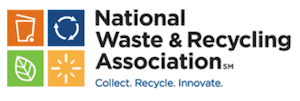Safety is a top priority for the National Waste & Recycling Association (NWRA) and its members. Our work is focused on making trash collection, processing and disposal operations less dangerous by encouraging safety training, assistance for compliance with regulations, company safety rules and policies. NWRA is the Secretariat for the American Standards Committee Z245 for Equipment Technology and Operations for Wastes and Recyclable Materials.
Industry Leadership
Our efforts to reduce incidents including fatalities, injuries and accidents are making a difference; however, the vital work of improving safety in our industry is ongoing. After a 12-year high in 2003, fatalities fell by more than half by 2007. Since then, fatalities have been trending upwards, according to data collected by the U.S. Bureau of Labor Statistics (BLS). There were 33 fatalities of refuse and recyclable material collectors in 2013, and in 2014, there were 27 fatalities, according to BLS data released in September 2015. While the number of fatalities declined from 2013 to 2014, the rate of fatalities rose from 33 to 35.8 per 100,000 workers in the same period. In 2016, there were 33 fatalities, and the rate of fatalities was 34.1 per 100,000 workers. In 2017, we held steady at 33 fatalities, and the rate of fatalities rose to 35 per 100,000 workers. In 2018, the number of fatalities spiked to 61, and the rate of fatalities also increased to 44.3 per 100,000 workers.
NWRA, along with its member companies and its state chapters, has successfully championed the passage of “Move Over” laws to protect workers in our industry, as many injuries and fatalities are caused by inattentive and distracted drivers and pedestrians. Currently, there are 31 states that protect waste and recycling workers.
NWRA supports a number of initiatives at no cost with the goal of promoting industrywide safety. These include:
- Safety Stand Down
- Safety Committee
NWRA offers a wide range of comprehensive safety programs for its member companies, including:
- Safety Monday, a relied upon source of weekly safety tips used as a tool by member companies as part of their safety awareness and training efforts. If you are not a member, please contact Kirk Sander at ksander@wasterecycling.org to discuss purchasing a Safety Monday license.
- Safety manuals that are available for drivers and workers in our industry
- Temporary worker safety training
- Commercial vehicle safety inspection demonstrations and briefings
- Hosted safety seminars at member company locations nationwide
- Online safety-related webinars and safety-focused education sessions at NWRA events
OSHA Compliance
Industry safety compliance is verified by the government, with inspections conducted by the Occupational Safety and Health Administration (OSHA) and approved state plans. The Association monitors OSHA’s enforcement actions and inspection trends and comments on proposed regulations that will affect the waste and recycling industry.
Safety Reference Documents
Site Safety Best Practices for MRFs, Landfills and Transfer Stations
Guide for Developing Lithium Battery Management Practices at Materials Recovery Facilities
Lithium-ion Battery Infographic: Consequences
Lithium-ion Battery Infographic White Label: Consequences
Lithium-ion Battery Infographic: Dead Batteries
Lithium-ion Battery Infographic White Label: Dead Batteries
Lithium-ion Battery Infographic: Did You Know?
Lithium-ion Battery Infographic White Label: Did You Know?
Lithium-ion Battery Infographic: Everywhere
Lithium-ion Battery Infographic White Label: Everywhere
Lithium-ion Battery Infographic: Hazards
Lithium-ion Battery Infographic White Label: Hazards
Lithium-ion Battery Infographic: Headlines
Lithium-ion Battery Infographic White Label: Headlines
Lithium-ion Battery Infographic: Improper Disposal
Lithium-ion Battery Infographic White Label: Improper Disposal
Lithium-ion One-pager: Best Practices – Dead Battery Storage
Lithium-ion One-pager White Label: Best Practices – Dead Battery Storage
Lithium-ion One-pager: Charging
Lithium-ion One-pager White Label: Charging
Lithium-ion One-pager: Proposal Disposal of Lithium Batteries
Lithium-ion One-pager White Label: Proposal Disposal of Lithium Batteries
Lithium-ion One-pager: Resources/Safety
Lithium-ion One-pager White Label: Resources/Safety
Lithium-ion One-pager: Solution
Lithium-ion One-pager White Label: Solution
Lithium-ion One-pager: Storage Tips
Lithium-ion One-pager White Label: Storage Tips
Lithium-ion One-pager: The Issue
Lithium-ion One-pager White Label: The Issue
Lithium-ion One-pager: What Are Lithium Batteries?
Lithium-ion One-pager White Label: What Are Lithium Batteries?
Lithium-ion Battery Poster White Label
Lithium-ion Battery Letter to the Editor: Are You Aware of the Hidden Hazard Lithium Batteries Pose?
Lithium-ion Battery Letter to the Editor: “Dead” Lithium Batteries – The Real Zombies
Lithium-ion Battery Letter to the Editor: Lithium Batteries – A Hidden Hazard
Lithium-ion Battery Letter to the Editor: Why E-Bikes, EVs and Laptops Are Catching Fire
Lithium-ion Battery Social Media Post: Consequences
Lithium-ion Battery Social Media Post: Dead Batteries
Lithium-ion Battery Social Media Post: Did You Know? 1
Lithium-ion Battery Social Media Post: Did You Know? 2
Lithium-ion Battery Social Media Post: Did You Know? 3
Lithium-ion Battery Social Media Post: Did You Know? 4
Lithium-ion Battery Social Media Post: Everywhere
Lithium-ion Battery Social Media Post: Hazards
Lithium-ion Battery Social Media Post: Headlines 1
Lithium-ion Battery Social Media Post: Headlines 2
Lithium-ion Battery Social Media Post: Headlines 3

